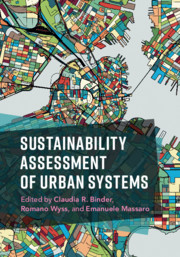Book contents
- Sustainability Assessment of Urban Systems
- Sustainability Assessment of Urban Systems
- Copyright page
- Contents
- Preface
- Acknowledgments
- Contributors
- General Introduction
- Part I Theoretical Background
- Part II Integrative Approaches for Sustainability Assessment
- 6 A Mixed-Method, Dialogue-Based Approach to Sustainability Assessments: Fostering Learning for Sustainable Development
- 7 Sustainability Assessment: Integrative Concept, Methodology, and Examples
- 8 Sustainability Solution Spaces
- 9 Assessing Urban Sustainability through Participatory Multi-Criteria Approaches (PMCAs): An Updated Comparative Analysis
- Part III Perspectives on Urban Sustainability
- Part IV Focal Points of Urban Sustainability
- Index
- References
8 - Sustainability Solution Spaces
from Part II - Integrative Approaches for Sustainability Assessment
Published online by Cambridge University Press: 27 March 2020
- Sustainability Assessment of Urban Systems
- Sustainability Assessment of Urban Systems
- Copyright page
- Contents
- Preface
- Acknowledgments
- Contributors
- General Introduction
- Part I Theoretical Background
- Part II Integrative Approaches for Sustainability Assessment
- 6 A Mixed-Method, Dialogue-Based Approach to Sustainability Assessments: Fostering Learning for Sustainable Development
- 7 Sustainability Assessment: Integrative Concept, Methodology, and Examples
- 8 Sustainability Solution Spaces
- 9 Assessing Urban Sustainability through Participatory Multi-Criteria Approaches (PMCAs): An Updated Comparative Analysis
- Part III Perspectives on Urban Sustainability
- Part IV Focal Points of Urban Sustainability
- Index
- References
Summary
This chapter presents Sustainability Solution Spaces for Decision-Making (SSP) as an integrative method for assessing sustainability. The SSP represents the room to manoeuvre in the system at hand so that it can develop sustainably. The approach fulfils (1) systemic criteria; (2) normative criteria; and (3) procedural criteria. It provides a consistent set of targets and considers the systemic relations among the indicators representing the city-region. This gives the decision-makers concise guidelines for sustainable decisions and makes them aware of the associated trade-offs. SSP can be pursued following a participatory and an expert approach. Whereas the expert approach requires high quality of data, preferably either over time or over a large number of cities, the participatory approach is more flexible and can deal with qualitative data. That is, the expert approach is appropriate for comparing large sets of cities with each other, clustering and providing benchmarks for specific city types, and delivering general indications where policy development is required. The participatory approach might be particularly useful for assessing the impact of a specific project or analysing a specific sector, such as mobility or housing, in depth.
Keywords
- Type
- Chapter
- Information
- Sustainability Assessment of Urban Systems , pp. 181 - 208Publisher: Cambridge University PressPrint publication year: 2020

